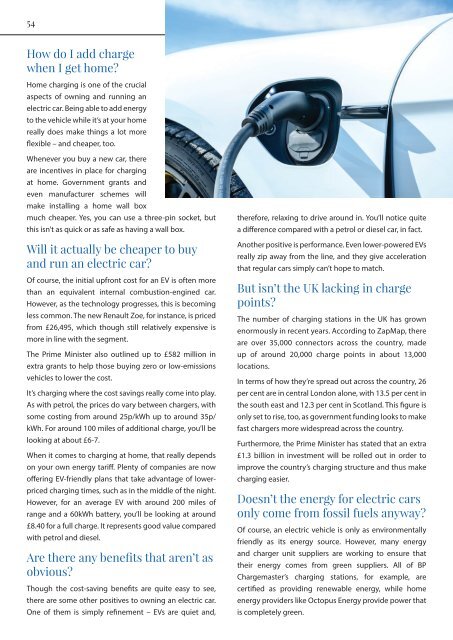You also want an ePaper? Increase the reach of your titles
YUMPU automatically turns print PDFs into web optimized ePapers that Google loves.
54<br />
How do I add charge<br />
when I get home?<br />
Home charging is one of the crucial<br />
aspects of owning and running an<br />
electric car. Being able to add energy<br />
to the vehicle while it’s at your home<br />
really does make things a lot more<br />
flexible – and cheaper, too.<br />
Whenever you buy a new car, there<br />
are incentives in place for charging<br />
at home. Government grants and<br />
even manufacturer schemes will<br />
make installing a home wall box<br />
much cheaper. Yes, you can use a three-pin socket, but<br />
this isn’t as quick or as safe as having a wall box.<br />
Will it actually be cheaper to buy<br />
and run an electric car?<br />
Of course, the initial upfront cost for an EV is often more<br />
than an equivalent internal combustion-engined car.<br />
However, as the technology progresses, this is becoming<br />
less common. The new Renault Zoe, for instance, is priced<br />
from £26,495, which though still relatively expensive is<br />
more in line with the segment.<br />
The Prime Minister also outlined up to £582 million in<br />
extra grants to help those buying zero or low-emissions<br />
vehicles to lower the cost.<br />
It’s charging where the cost savings really come into play.<br />
As with petrol, the prices do vary between chargers, with<br />
some costing from around 25p/kWh up to around 35p/<br />
kWh. For around 100 miles of additional charge, you’ll be<br />
looking at about £6-7.<br />
When it comes to charging at home, that really depends<br />
on your own energy tariff. Plenty of companies are now<br />
offering EV-friendly plans that take advantage of lowerpriced<br />
charging times, such as in the middle of the night.<br />
However, for an average EV with around 200 miles of<br />
range and a 60kWh battery, you’ll be looking at around<br />
£8.40 for a full charge. It represents good value compared<br />
with petrol and diesel.<br />
Are there any benefits that aren’t as<br />
obvious?<br />
Though the cost-saving benefits are quite easy to see,<br />
there are some other positives to owning an electric car.<br />
One of them is simply refinement – EVs are quiet and,<br />
therefore, relaxing to drive around in. You’ll notice quite<br />
a difference compared with a petrol or diesel car, in fact.<br />
Another positive is performance. Even lower-powered EVs<br />
really zip away from the line, and they give acceleration<br />
that regular cars simply can’t hope to match.<br />
But isn’t the UK lacking in charge<br />
points?<br />
The number of charging stations in the UK has grown<br />
enormously in recent years. According to ZapMap, there<br />
are over 35,000 connectors across the country, made<br />
up of around 20,000 charge points in about 13,000<br />
locations.<br />
In terms of how they’re spread out across the country, 26<br />
per cent are in central London alone, with 13.5 per cent in<br />
the south east and 12.3 per cent in Scotland. This figure is<br />
only set to rise, too, as government funding looks to make<br />
fast chargers more widespread across the country.<br />
Furthermore, the Prime Minister has stated that an extra<br />
£1.3 billion in investment will be rolled out in order to<br />
improve the country’s charging structure and thus make<br />
charging easier.<br />
Doesn’t the energy for electric cars<br />
only come from fossil fuels anyway?<br />
Of course, an electric vehicle is only as environmentally<br />
friendly as its energy source. However, many energy<br />
and charger unit suppliers are working to ensure that<br />
their energy comes from green suppliers. All of BP<br />
Chargemaster’s charging stations, for example, are<br />
certified as providing renewable energy, while home<br />
energy providers like Octopus Energy provide power that<br />
is completely green.


















